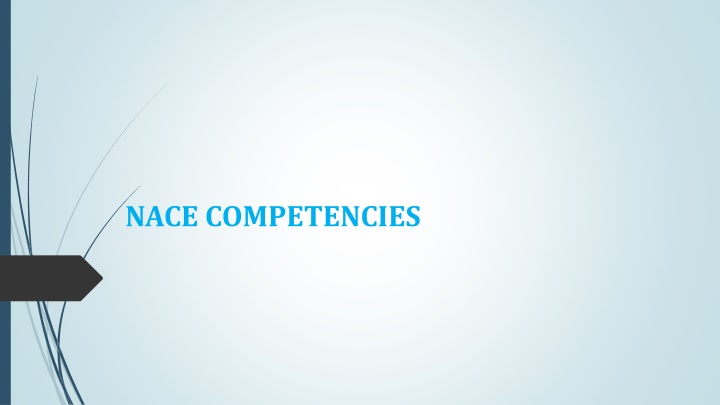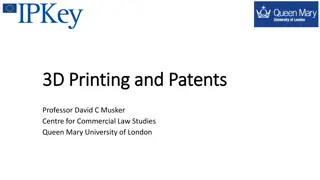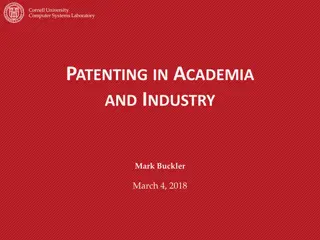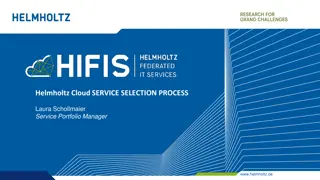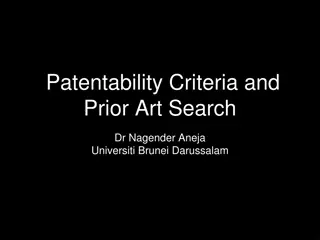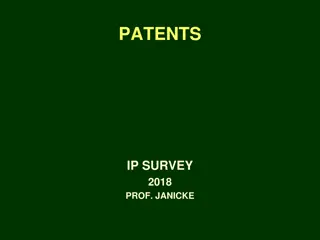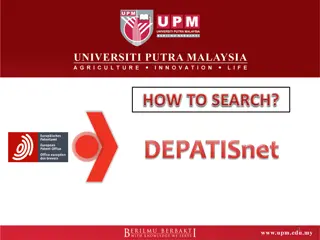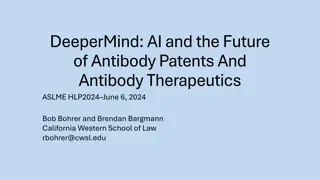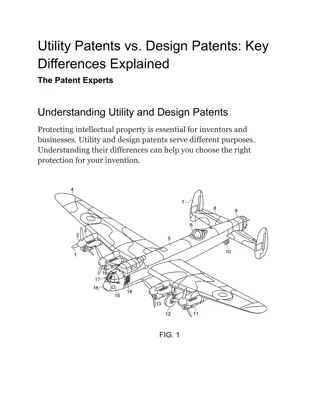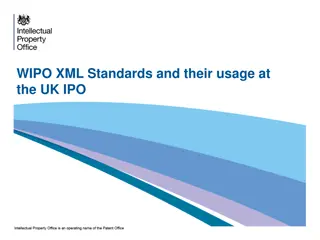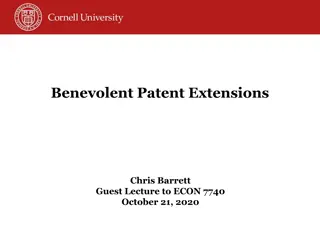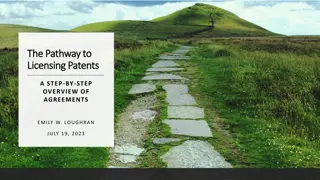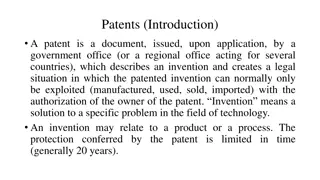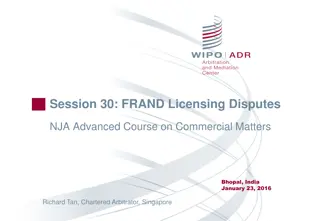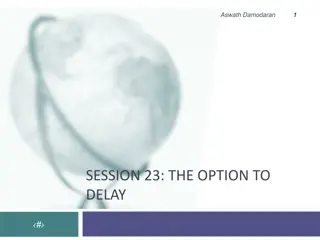Patents: Criteria and Application Process
A patent is a grant by the state to exclude others from using, selling, or importing an invention for a limited period in exchange for disclosing it. This grant is based on criteria such as novelty, inventive step, and industrial application. Prior art, anticipation, and inventive step are key factors in determining the patentability of an invention. Learn more about the patent specification and the importance of industrial application in this comprehensive guide.
Download Presentation

Please find below an Image/Link to download the presentation.
The content on the website is provided AS IS for your information and personal use only. It may not be sold, licensed, or shared on other websites without obtaining consent from the author.If you encounter any issues during the download, it is possible that the publisher has removed the file from their server.
You are allowed to download the files provided on this website for personal or commercial use, subject to the condition that they are used lawfully. All files are the property of their respective owners.
The content on the website is provided AS IS for your information and personal use only. It may not be sold, licensed, or shared on other websites without obtaining consent from the author.
E N D
Presentation Transcript
National Association of Colleges and Employers (NACE) Thousands of employers were surveyed to figure out what core competencies employers were looking for in college graduates to prove they are career ready, NACE identified eight core competencies Teamwork/Collaboration Leadership Critical Thinking Social Justice and Inclusion Career and Personal Development Professionalism Communication Digital Technology
Teamwork/Collaboration Build, develop and nurture relationships to enhance the inclusion of multiple perspectives, understanding areas of strength and areas of improvement, and having a foundational understanding of group dynamics A student can engage with others in group advisement, workshops, campus events and class projects An advisor can speak about a student coming prepared to advisor/career meetings, tutoring and class and creating academic and improvement plans
Leadership Adopt perspective to understand that leadership is a process, always evolving, not a position. That it is purposeful, collaborative, and value based, resulting in positive social change using empathetic skills to support and motivate others A student can seek out co-curricular opportunities such as student government, student clubs, experiential learning, and actively participating in research and fellowship opportunities An advisor can encourage students to try something new and step out of their comfort zones and to know when to ask for help
Critical Thinking Exercise sound reasoning, prior and newly learned knowledge, creativity and originality to analyze issues, make decisions, overcome challenges and achieve goals A student can take advantage of support and ask for feedback in meetings with advisors, faculty, career specialists, family members, community leaders, and can enroll in honors programs, hack-a-thons, leadership programs, clubs, etc. that all promote varied forms of learning An advisor can talk to students about knowing who/when to ask for help, deciding to withdraw from a course and calculating grades and GPA
Social Justice and Inclusion Participate in the ongoing process of gaining the knowledge, skills and openness needed to foster equitable participation of all groups, while engaging in anti-racist practices seeking to address and acknowledge issues of oppression, privilege and power (NASPA) and actively challenging the systems, structures, and policies that uphold institutional and systemic racism A student can join groups, campus events, online platforms, etc. to learn and teach others about anti-racism & social justice issues; they can promote and advocate for policies and leaders that are dedicated to dismantling systemic inequity An advisor can review electives that will expose the student to different worldviews and have them reflect on what they have learned. They can also review accessibility resources and discuss accommodations, self-care and self-advocacy
Career and Personal Development Explore values, interests, personality traits and skills to help identify possible career paths and create an action plan to be intentional about gaining relevant skills and pursuing opportunities and experiences, all while understanding that this is a process that includes the entire career journey Students can conduct self-assessments, and research and pursue internships, externships, and volunteer opportunities to gain experience and skills while seeking out opportunities to network with employers, community organizations, and other institutions An advisor can discuss academic and personal interests which could lead to a potential major/minor declaration, review elective choices and discuss post-graduation or transfer plans Assessment resources: Strong Interest Inventory, O*Net/My Next Move, Occupational Outlook Handbook
Professionalism Understand and meet stated expectations while also advocating for oneself; ask questions when clarification is needed. Act with integrity and responsibility, receive feedback openly, and learn from mistakes while demonstrating accountability, keeping self and larger community in mind Students can participate in relevant workshops and events and pursue experiential learning opportunities (internships, service learning); seek feedback from people they trust and respect: professors, college professionals, mentors, faith leaders, etc. An advisor can discuss how to prepare for meetings, take accountability, deal with challenging with situations and people and academic integrity
Communication Clearly and effectively express and understand verbal, written, and digital thoughts, ideas, and information, and non-verbal cues, both physical and virtual, using effective and appropriate platforms, tools, and styles when seeking to understand and be understood by different audiences. (It s also the number one skills all employers ask for). Students can take advantage of public speaking opportunities; participate in professional events such as mock interviews, writing intensive classes, refine and polish professional documents such as resume, cover letter, and LinkedIn profile An advisor can speak about email etiquette/netiquette, power of verbal and non-verbal cues. How to self-advocate when struggling in a course and knowing who/when/how to ask for help and how to learn to communicate proactively
Digital Technology Use digital technology (devices, platforms, apps, and services), both old and new, to ethically solve problems, complete tasks and goals, collaborate, and work efficiently. Reflect on your skill level and identify areas for additional learning Students can attend workshops, trainings, and other offerings on and off campus, create their digital artifacts (LinkedIn profile, etc.), utilize platforms such as LinkedIn; IG; TikTok, CUNYfirst, Blackboard, Office 365, and e-portfolio and stay up to date on new services, apps, and platforms An advisor can review students email accounts, discus how to access CUNYfirst and DegreeWorks; review how to use apps for time management and organization as well as how to identify scamming/phishing
